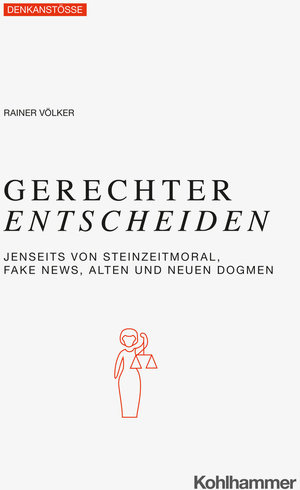
Gerechter Entscheiden
Jenseits von Steinzeitgerechtigkeit, Fake News, alten und neuen Dogmen
von Rainer VölkerJustice is regarded as being the crucial yardstick for human behaviour. There is consequently an expectation or a demand that decisions should be taken fairly and justly in the widest variety of contexts in professional and private life, as well as in relation to social responsibilities. The same facts should not be measured by different standards; no one should be discriminated against because of natural characteristics such as race, gender or appearance; fundamental human rights should be recognized unreservedly all over the world; and in the spirit of intergenerational justice, we should behave in a sustainable fashion and not live at the expense of later generations. This volume initially demonstrates that we are only able to live up to such requirements to a limited extent, and shows how the contradictions involved come about. Major reasons for this include using standards of justice that go back as far as the Stone Age, inadequate knowledge of economic and social interrelationships, and also one-sided information. In addition, it is only rarely that an individual=s own understanding of justice is concretely articulated, and this stands in the way of consistent argumentation from the outset. In conclusion, on the basis of the available scientific findings, this monograph outlines ways of overcoming the contradictions mentioned and arriving at more just decisions.Gerechtigkeit ist uns ein zentrales Anliegen; wir propagieren soziale und globale Gerechtigkeit, Nachhaltigkeit („Generationengerechtigkeit“), Chancengleichheit, Nichtdiskriminierung u. v. m. Anspruch und Realität klaffen oft weit auseinander: Unser Wohlstand ist uns viel wichtiger als das Überleben und die Not von Menschen in anderen Ländern. Wir verbrauchen mehrere Erden. Wir diskriminieren viel mehr als wir denken. Statt echtem Engagement gegen Hunger und Unterdrückung „kämpfen“ wir für neue Straßennamen oder betreiben „Virtue Signaling“ per Mausklick. Unsere Vorstellungen von Gerechtigkeit sind kaum konsistent und oft überholt; wir messen z. B. mit mehrerlei Maß oder beurteilen Menschen dogmatisch nach „Identitäten“. Das Buch erläutert die Ursachen dieser Widersprüche und zeigt, wie wir unseren Ansprüchen besser genügen können.







